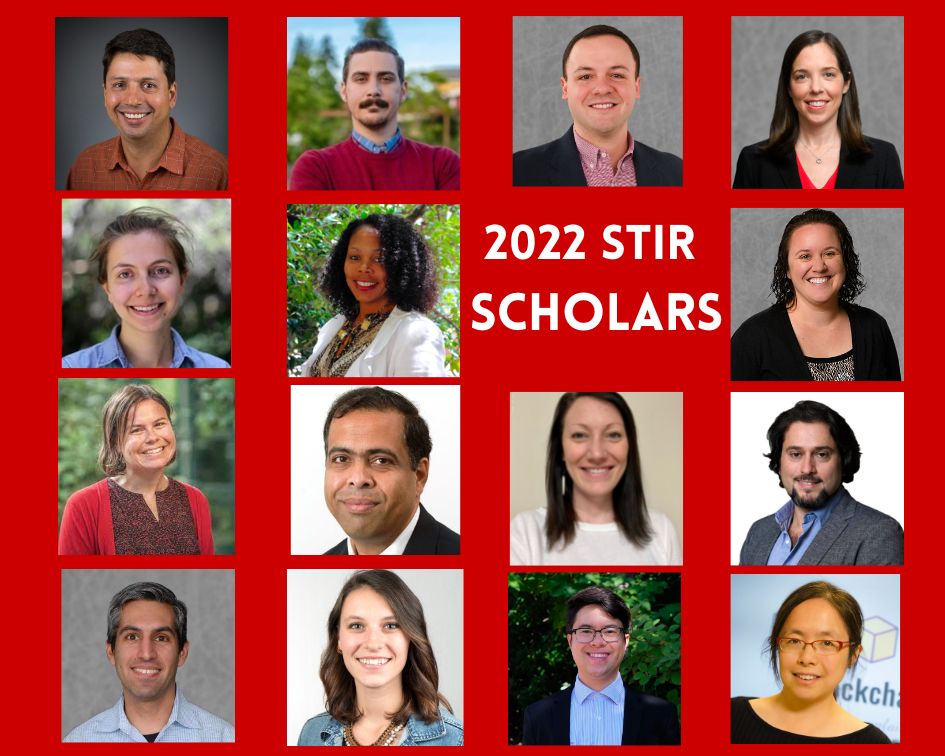
Scholars will use their research to contribute to society and develop their broader impact identities
After a competitive process, twelve members of the NC State faculty and staff community were selected for the inaugural Spring 2021 Impact Scholars cohort as part of the Strengthening The Impact of Research (STIR) program. With 50 applications from across the university, the initial call for the STIR program demonstrated researchers’ interest in expanding the impact of the work. The selected scholars demonstrated their current and potential for future contributions to the University’s broader impact mission.
This group of Impact Scholars will attend a series of workshops designed to strengthen their impact identities as well as their capacity to create innovative research impacts on society and write more competitive grant proposals. Impact Scholars will also design and implement a project of their own, and conduct a Research Impacts workshop within their respective departments.
In addition, thanks to support from the Office of Outreach and Engagement, Impact Scholars will receive $1,000 to support their upcoming projects.
The selected Impact Scholars represent a diverse cross-section of the University; they come from 9 different Colleges or Institutes; they are full, associate, and assistant professors, research associates, and postdoctoral scholars; and they come from a wide array of backgrounds.
The first cohort of Impact Scholars for Spring 2021 are:
 Jackie Relyea is an assistant professor in the College of Education. Her interests include literacy development and instruction of K-6 students from culturally and linguistically diverse backgrounds. Her research focus lies in a literacy intervention model that emphasizes the integration of literacy instruction in content areas to develop students’ academic vocabulary, reading comprehension, domain-specific content knowledge, and higher-order thinking skills, particularly for English learners and emergent bilinguals. Dr. Relyea earned her Ph.D. in Literacy Education from the University of North Carolina at Chapel Hill.
Jackie Relyea is an assistant professor in the College of Education. Her interests include literacy development and instruction of K-6 students from culturally and linguistically diverse backgrounds. Her research focus lies in a literacy intervention model that emphasizes the integration of literacy instruction in content areas to develop students’ academic vocabulary, reading comprehension, domain-specific content knowledge, and higher-order thinking skills, particularly for English learners and emergent bilinguals. Dr. Relyea earned her Ph.D. in Literacy Education from the University of North Carolina at Chapel Hill.
 Erin Baker is an associate professor in the College of Sciences. Her research has utilized techniques such as liquid chromatography, ion mobility spectrometry, and mass spectrometry to evaluate molecules present and changing in biological and environmental systems. Her research projects include the development of high-throughput analyses to study numerous samples in a short time period as well as informatics studies to evaluate the complex multi-omic data acquired. Dr. Baker earned her Ph.D. in Chemistry (specializing in Physical Chemistry) from the University of California, Santa Barbara.
Erin Baker is an associate professor in the College of Sciences. Her research has utilized techniques such as liquid chromatography, ion mobility spectrometry, and mass spectrometry to evaluate molecules present and changing in biological and environmental systems. Her research projects include the development of high-throughput analyses to study numerous samples in a short time period as well as informatics studies to evaluate the complex multi-omic data acquired. Dr. Baker earned her Ph.D. in Chemistry (specializing in Physical Chemistry) from the University of California, Santa Barbara.
 Ashly Cabas Mijares is an assistant professor in the College of Engineering. Her research interests include the assessment of seismic hazards, performance-based design in geotechnical engineering, the prediction of the response of soils and foundation systems to seismic loading and dynamic soil-foundation-structure interaction. Her research focuses particularly on the advancement of the current understanding of the impact that local soil conditions have on ground motions, improving the assessment of site-specific seismic hazards, and elucidating the correlation between ground motion parameters and structural response and damage. Dr. Cabas earned her Ph.D. in Civil Engineering from Virginia Tech.
Ashly Cabas Mijares is an assistant professor in the College of Engineering. Her research interests include the assessment of seismic hazards, performance-based design in geotechnical engineering, the prediction of the response of soils and foundation systems to seismic loading and dynamic soil-foundation-structure interaction. Her research focuses particularly on the advancement of the current understanding of the impact that local soil conditions have on ground motions, improving the assessment of site-specific seismic hazards, and elucidating the correlation between ground motion parameters and structural response and damage. Dr. Cabas earned her Ph.D. in Civil Engineering from Virginia Tech.
 Jesse Contreras is a postodoctoral researcher in the College of Natural Resources working with Dr. Ayse Ercumen in the Department of Forestry and Environmental Resources. His research includes conducting and reporting on epidemiological analyses on data collected as part of the WASH-Benefits Bangladesh trial of a sanitation intervention. His work is attempting to understand how latrine access, community coverage, and exposure to animals interact to affect children’s health and environmental contamination. Dr. Contreras earned his Ph.D. in Epidemiology from the University of Michigan.
Jesse Contreras is a postodoctoral researcher in the College of Natural Resources working with Dr. Ayse Ercumen in the Department of Forestry and Environmental Resources. His research includes conducting and reporting on epidemiological analyses on data collected as part of the WASH-Benefits Bangladesh trial of a sanitation intervention. His work is attempting to understand how latrine access, community coverage, and exposure to animals interact to affect children’s health and environmental contamination. Dr. Contreras earned his Ph.D. in Epidemiology from the University of Michigan.
 Robin Dodsworth is a professor in the College of Humanities and Social Sciences. Her research interests include a project studying vowel change using a corpus of conversational data from over 300 native residents of Raleigh, NC. Her research examines how the Southern Vowel Shift is in decline in Raleigh as the result of large-scale migration from outside the South. One of her project’s main goals is to use contemporary social network methods to look at the social distribution of the linguistic variables. Dr. Dodsworth earned her Ph.D. in Linguistics from Ohio State University.
Robin Dodsworth is a professor in the College of Humanities and Social Sciences. Her research interests include a project studying vowel change using a corpus of conversational data from over 300 native residents of Raleigh, NC. Her research examines how the Southern Vowel Shift is in decline in Raleigh as the result of large-scale migration from outside the South. One of her project’s main goals is to use contemporary social network methods to look at the social distribution of the linguistic variables. Dr. Dodsworth earned her Ph.D. in Linguistics from Ohio State University.
 Callie Womble Edwards is a research associate at the Friday Institute, where she evaluates educational initiatives using quantitative and qualitative methodologies. Her research examines how individual schools, school districts, and higher education institutions can improve their spaces to better support historically underrepresented student and staff populations such as women, racial and ethnic minorities, and low-income individuals. Another major aspect of Dr. Edwards’ work is developing and maintaining effective research-practice partnerships (RPPs) with schools and districts. Dr. Edwards earned her Ph.D. in Educational Research and Policy Analysis from North Carolina State University.
Callie Womble Edwards is a research associate at the Friday Institute, where she evaluates educational initiatives using quantitative and qualitative methodologies. Her research examines how individual schools, school districts, and higher education institutions can improve their spaces to better support historically underrepresented student and staff populations such as women, racial and ethnic minorities, and low-income individuals. Another major aspect of Dr. Edwards’ work is developing and maintaining effective research-practice partnerships (RPPs) with schools and districts. Dr. Edwards earned her Ph.D. in Educational Research and Policy Analysis from North Carolina State University.
 Xiaomeng Fang is an assistant professor in the Wilson College of Textiles. Her research focuses on the development of advanced flexible/fiber-based electronics, such as fiber actuators, fiber sensors and generators as well as functional/smart textiles assembled by fiber electronics. Additionally, she also investigated textile protection/comfort and textile reinforced composites. Her overarching research interest is the application of fibers and textiles to solve many of the life quality issues including health and well-being. Dr. Fang earned her Ph.D. in Fiber and Polymer Science from North Carolina State University.
Xiaomeng Fang is an assistant professor in the Wilson College of Textiles. Her research focuses on the development of advanced flexible/fiber-based electronics, such as fiber actuators, fiber sensors and generators as well as functional/smart textiles assembled by fiber electronics. Additionally, she also investigated textile protection/comfort and textile reinforced composites. Her overarching research interest is the application of fibers and textiles to solve many of the life quality issues including health and well-being. Dr. Fang earned her Ph.D. in Fiber and Polymer Science from North Carolina State University.
 Erin Frey is a Research Assistant Professor in the College of Veterinary Medicine. Her research has focused on the interplay of human, animal and environmental health. Specifically, it involves understanding how antibiotics are used in dogs and cats and finding effective ways to promote good stewardship of antibiotics by animal caretakers and animal medical professionals. Currently, her projects include identifying potential collaborative community partners to operationalize antimicrobial stewardship principles for the benefit of society. Dr. Frey earned her doctorate in Veterinary Medicine from North Carolina State University.
Erin Frey is a Research Assistant Professor in the College of Veterinary Medicine. Her research has focused on the interplay of human, animal and environmental health. Specifically, it involves understanding how antibiotics are used in dogs and cats and finding effective ways to promote good stewardship of antibiotics by animal caretakers and animal medical professionals. Currently, her projects include identifying potential collaborative community partners to operationalize antimicrobial stewardship principles for the benefit of society. Dr. Frey earned her doctorate in Veterinary Medicine from North Carolina State University.
 Maru Gonzalez is an assistant Professor in the College of Agricultural and Life Sciences. Her research has focused on school counselor advocacy with LGBTQ+ students. Currently, Dr. Gonzalez is Program Director for #PassTheMicYouth, a youth-led podcast and blog which aims to amplify youth voices, shine a spotlight on youth activism, and provide educators with resources for cultivating critical consciousness. Her current research seeks to pilot a critical positive youth development (CPYD) curriculum she designed to kids across NC. She earned her Ed.D in Student Development from the University of Massachusetts Amherst.
Maru Gonzalez is an assistant Professor in the College of Agricultural and Life Sciences. Her research has focused on school counselor advocacy with LGBTQ+ students. Currently, Dr. Gonzalez is Program Director for #PassTheMicYouth, a youth-led podcast and blog which aims to amplify youth voices, shine a spotlight on youth activism, and provide educators with resources for cultivating critical consciousness. Her current research seeks to pilot a critical positive youth development (CPYD) curriculum she designed to kids across NC. She earned her Ed.D in Student Development from the University of Massachusetts Amherst.
 Roger Narayan is a professor in the College of Engineering. His research involves a variety of laser direct writing methods, including matrix-assisted pulsed-laser evaporation direct write and two-photon polymerization, for additive manufacturing of biomaterials and medical devices. Recently, he has focused on efforts to recruit participation by students from underrepresented groups in the biomedical engineering department both at the undergraduate level and graduate level. Dr. Narayan earned his Ph.D. in Materials Science and Engineering from North Carolina State University and his M.D. from the Wake Forest University School of Medicine.
Roger Narayan is a professor in the College of Engineering. His research involves a variety of laser direct writing methods, including matrix-assisted pulsed-laser evaporation direct write and two-photon polymerization, for additive manufacturing of biomaterials and medical devices. Recently, he has focused on efforts to recruit participation by students from underrepresented groups in the biomedical engineering department both at the undergraduate level and graduate level. Dr. Narayan earned his Ph.D. in Materials Science and Engineering from North Carolina State University and his M.D. from the Wake Forest University School of Medicine.
 Yuhan (Douglas) Rao is a postdoctoral research scholar at the North Carolina Institute for Climate Studies. His current research focuses on generating a blended near-surface air temperature dataset by integrating in situ measurements and satellite observations via innovative statistical models. His broader research interests focus on advanced statistical models, satellite data development/validation, land–atmosphere interaction, and applied research for climate and environment monitoring. Dr. Rao earned his Ph.D. in Geographical Sciences from University of Maryland, College Park.
Yuhan (Douglas) Rao is a postdoctoral research scholar at the North Carolina Institute for Climate Studies. His current research focuses on generating a blended near-surface air temperature dataset by integrating in situ measurements and satellite observations via innovative statistical models. His broader research interests focus on advanced statistical models, satellite data development/validation, land–atmosphere interaction, and applied research for climate and environment monitoring. Dr. Rao earned his Ph.D. in Geographical Sciences from University of Maryland, College Park.
 Traci Rider is an assistant professor in the College of Design. Her research projects include methods for introducing building science and health topics to middle school students in North Carolina through STEM exercises, as well as supporting the development of interdisciplinary focus areas for the NC State in the areas of Sustainable Cities. Her research interests include design culture and the influence of sustainability; human-environment relations, including allowances and affordances; impacts of the built environment on health and well-being; designed spaces for environmental education; and design for special populations including children and the elderly. Dr. Rider earned her Ph.D. in Design from North Carolina State University.
Traci Rider is an assistant professor in the College of Design. Her research projects include methods for introducing building science and health topics to middle school students in North Carolina through STEM exercises, as well as supporting the development of interdisciplinary focus areas for the NC State in the areas of Sustainable Cities. Her research interests include design culture and the influence of sustainability; human-environment relations, including allowances and affordances; impacts of the built environment on health and well-being; designed spaces for environmental education; and design for special populations including children and the elderly. Dr. Rider earned her Ph.D. in Design from North Carolina State University.
